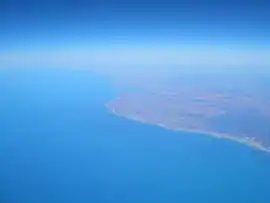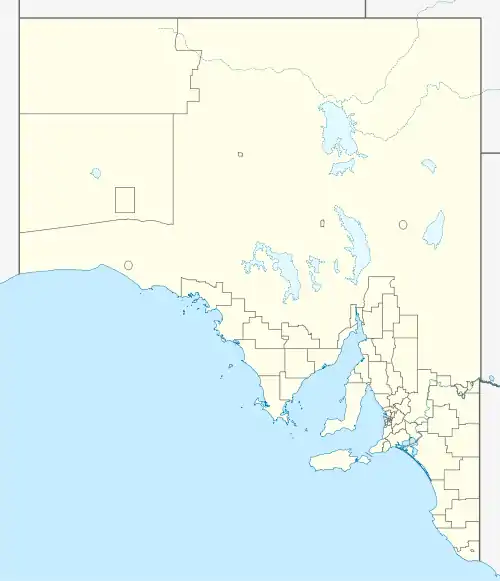Franklin Harbor Conservation Park
Franklin Harbor Conservation Park is a protected area in the Australian state of South Australia located on the east coast of Eyre Peninsula in the gazetted locality of Cowell about 5 kilometres (3.1 miles) south of the town centre in Cowell.[2][5]
| Franklin Harbor Conservation Park South Australia | |
|---|---|
IUCN category Ia (strict nature reserve)[1] | |
 Aerial view of the east coast of Eyre Peninsula near Cowell - the peninsula on the right side is within the conservation park. | |
 Franklin Harbor Conservation Park | |
| Nearest town or city | Cowell.[2] |
| Coordinates | 33°44′39″S 136°56′17″E |
| Established | 22 January 1976[3] |
| Area | 13.56 km2 (5.2 sq mi)[4] |
| Managing authorities | Department for Environment and Water |
| See also | Protected areas of South Australia |
The conservation park consists of land on a peninsula that encloses the south east side of Franklin Harbor and on four islands within Franklin Harbor including Entrance Island.[6] The conservation park occupies land in Sections 258, 259, 260 and 261 of the cadastral unit of the Hundred of Playford.[3]
The conservation park was proclaimed on 22 January 1976 under the National Parks and Wildlife Act 1972.[3][7] As of July 2016, the conservation park covered an area of 13.56 square kilometres (5.24 sq mi).[4] Since 2012, the conservation park has been overlapped by the protected area known as the Franklin Harbor Marine Park.[8]
As of 1982, the conservation park was considered to have "significance" for the following reasons:[5]
...(it) preserves an area of mangrove and samphire flats, an association that is markedly depleted in South Australia. The entrance islands ... contain a population of death adders. The islands also provide a safe roosting and feeding site for sea birds.
As of 1982, the flora of the conservation park was described as follows:[5]
Two of the islands and the protected side of the peninsula feature a low woodland of Avicennia marina and a samphire shrubland (Arthrocnemum spp.). The seaward side of the peninsula features a sandy beach backed by minor areas of open scrubland dominated by boxthorn, with scattered Callitris, Santalum, Leucopogon and Nitraria.
The conservation park is classified as an IUCN Category Ia protected area.[1] In 1982, it was listed on the now-defunct Register of the National Estate.[5]
See also
References
- "Terrestrial Protected Areas of South Australia (refer 'DETAIL' tab )". CAPAD 2016. Australian Government, Department of the Environment (DoE). 2016. Retrieved 21 February 2018.
- "Search result for "Franklin Harbor Conservation Park" (Record no SA0024905) with the following layers being selected - "Parcel labels", "Suburbs and Localities", "Hundreds", "Place names (gazetteer)" and "Road labels"". Property Location Browser. Government of South Australia. Retrieved 9 April 2017.
- "NATIONAL PARKS AND WILDLIFE ACT, 1972-1974: FRANKLIN HARBOR CONSERVATION PARK CONSTITUTED" (PDF). The South Australian Government Gazette. Government of South Australia: 259. 22 January 1976. Retrieved 10 April 2017.
- "Protected Areas Information System - reserve list (as of 11 July 2016)" (PDF). Department of Environment Water and Natural Resources. 11 July 2016. Retrieved 14 July 2016.
- "Franklin Harbour (sic) Conservation Park, Cowell, SA, Australia - listing on the now-defunct Register of the National Estate (Place ID 6682)". Australian Heritage Database. Department of the Environment. 28 September 1982. Retrieved 11 January 2019.
- "Protected Areas of South Australia September (Map) 2016 Edition" (PDF). Department of Environment, Water and Natural Resources (DEWNR). 12 December 2016. Retrieved 10 April 2017.
- "Franklin Harbor Conservation Park". Gazetteer of Australia online. Geoscience Australia, Australian Government.
- "Search result for "Franklin Harbor Conservation Park" (Record no SA0040585) with the following data sets selected - "Suburbs and Localities", "NPW and Conservation Reserve Boundaries" and "State Marine Park Network"". Location SA Map Viewer. Government of South Australia. Retrieved 10 April 2017.